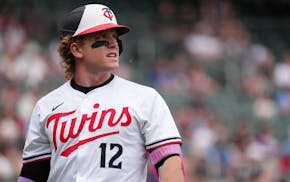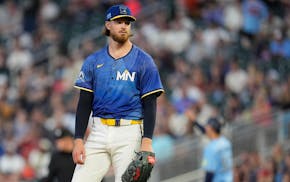OAKLAND, CALIF. – A lot of challenges can derail a pitcher during a start, from command issues to mechanical details. On Saturday, Bailey Ober's biggest challenge was … killing time? Staying awake?
Probably. Like a lopsided hockey game where all the action is on one end of the ice, the Twins batted and batted and batted against the Athletics on Saturday, pausing only occasionally to allow Ober to make a brief cameo on the mound, just because rules require it.
The Twins piled up eight runs and 10 hits in the first two innings, Ober never faced more than four batters in any of his complete-game nine innings and the Twins enjoyed one of the most remarkable victories of their season 10-2 at Oakland Coliseum.
"I've seen some exceptional pitching performances, but it was just nothing but effectiveness, everywhere you looked," manager Rocco Baldelli said of Ober's 89-pitch masterpiece. "How many balls did he end up throwing? Nineteen? I mean, to throw fewer than 20 balls in a nine-inning complete game — amazing."
Historic, too. Ober became the fifth pitcher in Twins history to pitch nine innings without reaching 90 pitches, and the first since Carlos Silva needed only 74 against Milwaukee in 2005. The last major leaguer to equal the feat was Miami's Sandy Alcántara in 2019.
And Ober's career-high-tying 10 strikeouts made the start even more unique. Since pitch counts were recorded beginning in the 1970s, only one other pitcher, according to MLB.com, has thrown nine innings with double-digit strikeouts on fewer than 90 pitches — Yankees righthander David Cone, during his perfect game July 18, 1999 against Montreal.
"I knew my pitch count was low, just because there were a lot of fast innings. But after the seventh inning, I walked past Pete [Maki, the pitching coach] and said, 'I'm finishing it,' " Ober said. "That's what my goal was."
He had plenty of time to track his stats and make goals — heck, he had time to do a little shopping between innings — because the Twins offense unloaded on A's starter J.P. Sears. Carlos Correa, Jose Miranda and Manuel Margot collected three hits apiece, Margot's highlighted by a three-run homer, and every starter but Byron Buxton reached base at least twice.
Ten of the Twins' first 11 hitters reached base in the second inning, some of them hot smashes all over the park, some broken-bat tweeners that add up when things are going bad.
"Doing it early is nice, to grab a lead," Baldelli said. "Wonderful game for [Margot]. He's been playing good baseball. He's had a lot of good at-bats. He's hit balls hard all over the field."
Ober was the beneficiary, of course — or maybe the offense was the beneficiary the tall righthander, who allowed solo home runs in each of the first two innings, a double to former teammate Brent Rooker in the fourth, and zero other baserunners, retiring the final 17 hitters he faced.
It made any conversations about taking him out seem foolish.
"Pete who? I didn't talk to Pete today," Baldellii said. "Pete did a great job with his pitcher today, and I barely spoke with him. It's an amazing sign — to get me to not talk to Pete Maki during the game takes a lot. But Bailey gave us a lot."
By throwing strikes with more than 70% of his pitches, Ober spent more than twice as much time watching from the dugout as pitching on the mound. Only in the second inning, when he struck out two batters, and the eighth, when he struck out all three, did Ober throw as many as 13 pitches, and four times he headed back to the dugout without needing 10.
By contrast, A's pitchers threw more than 13 in eight of the nine innings, including more than 30 three times. Sears needed 50 to record four outs (and allow eight runs) and reliever Osvaldo Bido threw a staff-saving 106 pitches over five innings.
"This was the first complete game I've thrown since college. It's been awhile, feels good to get the first one," Ober said. "It's pretty cool. Me and Joe [Ryan] have talked about it, how throwing 'a Maddux,' [for Hall of Famer Greg Maddux] is under 100 [pitches]. So it's pretty cool to be able to do it."

Twins lose second in a row to Blue Jays as bullpen falters late
What is the 'House settlement,' and what does it mean for the Gophers and NCAA?

Souhan: Anxiety and depression in the NFL helped inspire Lindsey Young's children's book
Neal: Trade season is here ... and now it's time for the Twins to act
